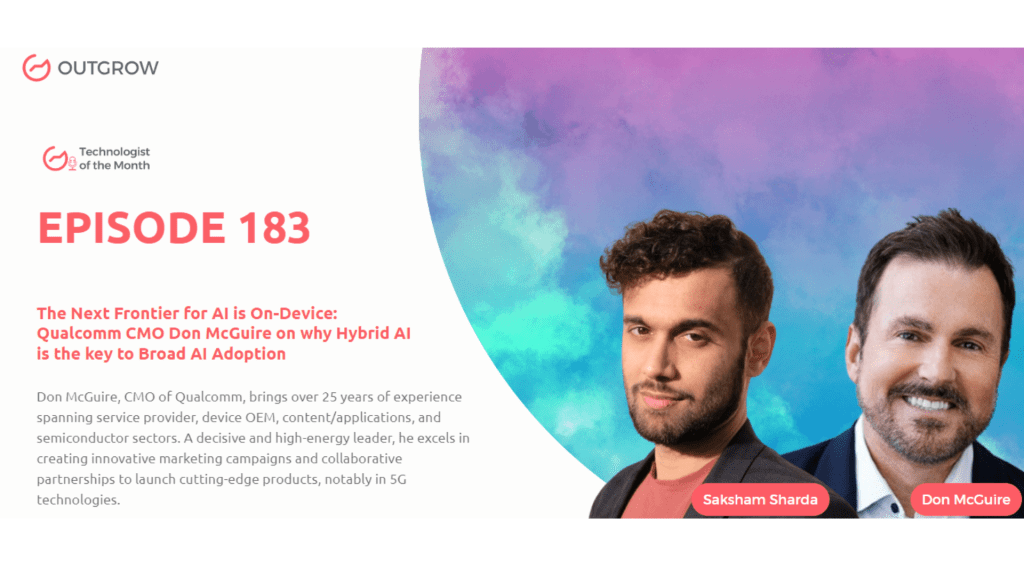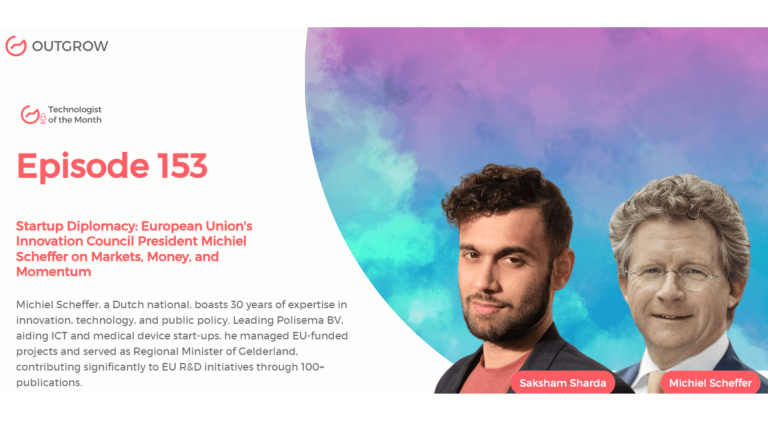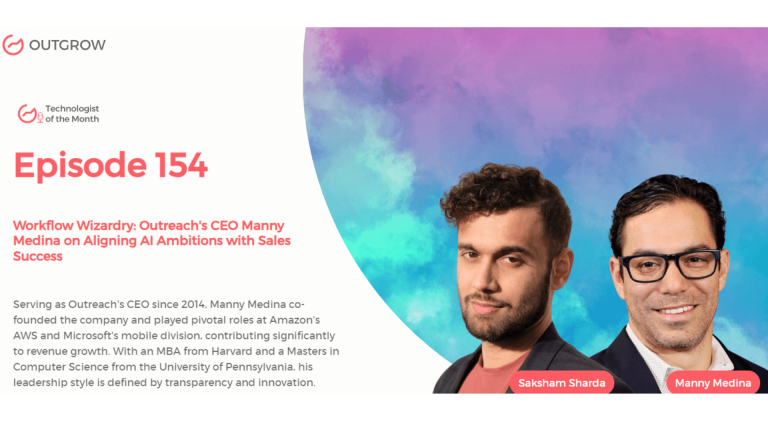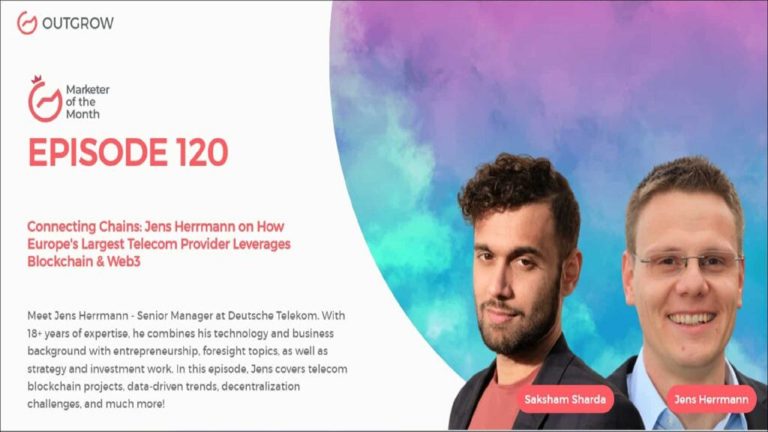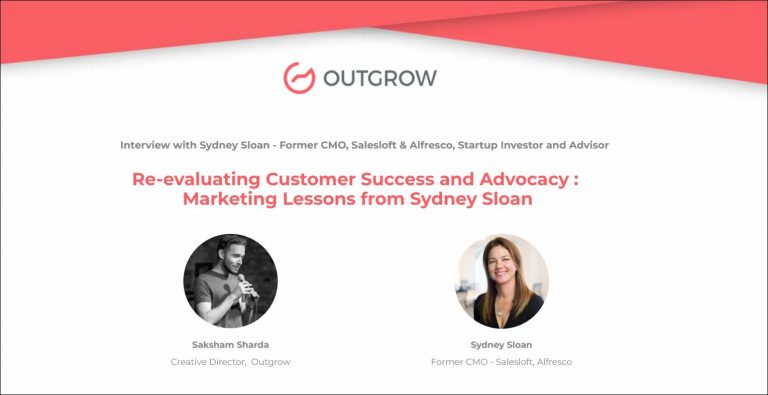Summarize with :
EPISODE 183: Marketer of the Month Podcast with Don McGuire
Table of Contents
Hey there! Welcome to the Marketer Of The Month blog!
We recently interviewed Don McGuire for our monthly podcast – ‘Marketer of the Month’! We had some amazing insightful conversations with Don and here’s what we discussed about –
1. Enhancing device capabilities for user benefit through efficient on-device AI.
2. Potential privacy risks and benefits of on-device AI proliferation.
3. Scaling AI across devices, edge, and cloud for sustainability and user benefits.
4. Ensuring stakeholder alignment and cybersecurity in AI integration.
5. Measuring awareness, sentiment, and brand affinity for ROI assessment.
6. Separating B2B and B2C branding for audience-led storytelling.
7. Embracing AI for augmentation, not replacement, with governance and principles.
About our host:
Dr. Saksham Sharda is the Chief Information Officer at Outgrow.co. He specializes in data collection, analysis, filtering, and transfer by means of widgets and applets. Interactive, cultural, and trending widgets designed by him have been featured on TrendHunter, Alibaba, ProductHunt, New York Marketing Association, FactoryBerlin, Digimarcon Silicon Valley, and at The European Affiliate Summit.
About our guest:
Don McGuire, CMO of Qualcomm, brings over 25 years of experience spanning service provider, device OEM, content/applications, and semiconductor sectors. A decisive and high-energy leader, he excels in creating innovative marketing campaigns and collaborative partnerships to launch cutting-edge products, notably in 5G technologies.
The Next Frontier for AI is On-Device: Qualcomm CMO Don McGuire on why Hybrid AI is the key to Broad AI Adoption
The Intro!
Saksham Sharda: Hi, everyone. Welcome to another episode of Outgrow’s Marketer of the Month. I’m your host, Dr. Saksham Sharda, and I’m the creative director at Outgrow. co. And for this month we are going to interview Don McGuire, CMO of Qualcomm. Thanks for joining us, Don.
Don McGuire: Great to be here. Thank you.
Don’t have time to read? No problem, just watch the Podcast!
Or you can just listen to it on Spotify!
The Rapid Fire Round!
Saksham Sharda: Let’s start with the rapid-fire round. The first one is, at what age do you want to retire?
Don McGuire: 10 years ago.
Saksham Sharda: How long does it take you to get ready in the mornings?
Don McGuire: 30 minutes.
Saksham Sharda: Your favorite dish.
Don McGuire: Pasta, any kind of pasta.
Saksham Sharda: Favorite color?
Don McGuire: Black.
Saksham Sharda: What time of day are you most inspired?
Don McGuire: In the morning.
Saksham Sharda: How many hours of sleep can you survive on?
Don McGuire: Four.
Saksham Sharda: Fill in the blank. An upcoming marketing trend is _____.
Don McGuire: An upcoming marketing trend is the use of AI.
Saksham Sharda: The biggest mistake of your career?
Don McGuire: Joining a company without fully understanding the people who you’re running it.
Saksham Sharda: How do you relax?
Don McGuire: I jump on the Peloton.
Saksham Sharda: How many cups of coffee do you drink per day?
Don McGuire: I don’t drink coffee.
Saksham Sharda: The most valuable skill you’ve learned in life.
Don McGuire: How you do something is as important as what you do.
Saksham Sharda: Your favorite Netflix show?
Don McGuire: Favorite Netflix show?
Saksham Sharda: Or any OTT platform.
Don McGuire: Oh right now. Masters of the Air.
Saksham Sharda: One-word description of your leadership style.
Don McGuire: Open.
Saksham Sharda: Top priority in your daily schedule.
Don McGuire: Engagement.
Saksham Sharda: Ideal vacation spot for relaxation.
Don McGuire: Any beach.
Saksham Sharda: Key factor for maintaining a work-life balance.
Don McGuire: Exercise. Caffeine, ice cream.
Saksham Sharda: Wait, but you don’t drink coffee. It’s another caffeine. Memorable career milestone.
Don McGuire: CMO of Qualcomm.
The Big Questions!
Saksham Sharda: Wait, that’s the end of the rapid-fire round. Now we can go into the longer questions, which you can answer with as much ease and time as you like. Okay. The first one is your role as a vice president and global head. Whoops. Sorry. This is not your document. Can you elaborate on Qualcomm’s approach to enabling on-device AI and why it’s essential for scaling generative AI?
Don McGuire: Sure. Well, our approach to on-device AI is making sure that all of our platforms that go into this amazing array of devices, whether it’s your car or your phone or your PC or your glasses have the most high performance, low power consumption computational coding capabilities along with world-leading connectivity and onboard intelligence to deliver an on-device AI experience that can be beneficial to users. Why is on-device AI important to scale? AI in general is because the technology itself has to proliferate across devices, the edge, and the cloud for it to scale, for it to be sustainable, and for it to deliver the user benefits. That can only happen when you’ve got on-device AI capabilities like personalization, low latency, and security.
Saksham Sharda: So are there any risks that this proliferation across different platforms can lead to any danger to user privacy or data security?
Don McGuire: I think if we don’t move to a hybrid or if AI does not scale in a hybrid way, the risks are higher for lack of security than if we do move to this hybrid. The inherent benefits of advice offer more security and more options for your data to stay your data and not risk more data being put into a public cloud environment where it could be used appropriately or stolen or you not receiving credit of ownership for your individual IP.
Saksham Sharda: So in what ways do you foresee AI devices impacting both B2B and B2C markets in 2024, especially with the rise of AI-powered PCs?
Don McGuire: From a productivity and efficiency standpoint, AI tools are starting to proliferate in the workplace today. I, myself and my team, have deployed a few AI tools that are kickstarting the ideation process from a creative standpoint. They are helping to drive more efficient content development, and faster time to market as well as freeing up my team from mundane tasks to be able to be better critical thinkers establish a more work-life balance, and be able to focus on things that are more important than just daily mundane tasks that AI can easily do and or kickstart for them.
Saksham Sharda: And are there any potential challenges companies might face in integrating AI-powered PCs into the existing workflows or products?
Don McGuire: I think the biggest challenge is making sure that all stakeholders across your enterprise are informed. All concerns are out on the table. AI tools are properly vetted for how they’re trained from a legal perspective. The risk of cyber hacking or cybersecurity has been taken into consideration and then the relevancy of the tool and its application are put in the right place with the right people. Those are the biggest challenges and opportunities for deploying AI tools across any enterprise for business.
Saksham Sharda: So as a CMO of a B2B company, how do you navigate building a consumer brand like Snapdragon while maintaining focus on business value?
Don McGuire: Well, we’ve done that by actually separating our B2B and B2C brands. So Snapdragon is our more consumer-facing brand. Qualcomm is the master brand, the name of the company and its application is with B2B audiences, investors, policymakers, and business decision-makers. It’s really about being audience-led and then appropriately building brand ethos around those important audiences so that you can then deliver your story. Because We’re all storytellers at the end of the day to those audiences in a compelling and relevant way.
Saksham Sharda: And so our audience is interested in what metrics or indicators Qualcomm uses to measure the success and ROI of its consumer branding efforts?
Don McGuire: We have both hard metrics and soft metrics. On the hard KPI side, we measure everything from awareness down to purchase intent. We also analyze willingness to pay a premium for devices that are powered by our platforms. That’s another hard KPI. From a soft KPI perspective, we are also measuring sentiment across social media and emotional connection to the brand affinity with certain audiences.
Saksham Sharda: So do you have any lessons to share for best practices for effectively communicating complex B2B technology to a broader consumer audience?
Don McGuire: Start with realizing that content in time-based content, you can only share so much of the story and the objective shouldn’t be to tell everything within a 32nd or a 15-second window or at the speed of TikTok, but to just get people interested in your story and then driving them through a longer content journey. And the more they’re interested, the more they’re going to listen and learn by applying appropriate messages and appropriate pieces of the story in the relevant and appropriate content type so that you can drive that interest.
Saksham Sharda: Could you not talk a bit about Qualcomm’s strategic brand partnerships with entities like Manchester United and Mercedes-AMG PETRONAS F1 team, and how they contribute to your business growth?
Don McGuire: Absolutely. Why? I’m a big believer that brand value drives business value. And so the partnerships that we’ve forged with Mercedes F1 as well as Manchester United, the mobile eSports competition that we’ve built globally, are all organized around people’s passion points. Whether it’s a passion for sports or passion for music, or passion for photography, our passion for gaming, and then because our technology platforms enable people to explore and ignite those passions. So, we think hard about brand partnerships that will be forged. We look for brand value alignment between our brand and their brand, and then we look for the benefits and the ROI that we can derive from any sort of partnership on our side as well as what value we can bring to our partners with our technology and our platforms to help them either digitally transform themselves or enhance their brand value to their audiences. Manchester United’s global 1.1 billion fans primarily partnered with Manchester United from a Snapdragon perspective to help scale brand value for Snapdragon, both at the awareness and consideration levels as well as down to preference. We met at Formula One, our Mercedes partnership is a nod to our growth in automotive and our rag and digital chassis platforms because oftentimes innovation in automotive starts in F1. So we thought it was very important to be a part of the F1 ecosystem, and we couldn’t think of a better partner than Mercedes. Again, like-minded brands value their innovation mentality, and their dedication to technology is very similar to ours. So those are two examples of our brand partnerships: how we build them and how we build ethos.
Saksham Sharda: And so what advice would you have for SMEs (small and medium enterprises) and startups looking to establish strategic brand partnerships of their own to enhance their business value?
Don McGuire: Start with relevancy. Why would you choose this partner and what is this partner going to deliver back to your business? I think a lot of brands tend to engage in what I call kind of logo, logo slapping meaning they just slap their logo on anything without really understanding what, the entire value equation is by being engaged either in that activity or with that brand or in that sport or whatever it might be. So really understanding what your objectives are, your business objectives, and then how engaging in a partnership, a specific partnership, is going to help you achieve those business objectives.
Saksham Sharda: So besides logo slapping, are there any other common pitfalls or mistakes you’ve observed when it comes to forming brand partnerships and how can they be avoided?
Don McGuire: I think first of all strong negotiation is important. Establishing a win-win for both yourself and the partner that you’re engaging with, I think is very important as well. And then negotiate the value that you want to extract from the partnership and the areas that are most meaningful to the audience you’re trying to reach.
Saksham Sharda: So now let’s talk about something lighter. Like what does your typical day at Qualcomm look like?
Don McGuire: I wake up in the morning, I hop on my Peloton, I go to Starbucks, I get to the office. I have a lot of meetings, a lot of collaboration, and a lot of engagement. Qualcomm is a very collaborative culture and any innovation engine requires a lot of collaboration. So there’s the impromptu meetings, there’s the hallway conversations, there’s the more structured meetings, and I aim every day to kind of move the needle on productivity just a little bit further forward. And then getting out of the office at a reasonable hour and then enjoying the rest of my day.
Saksham Sharda: How can SMEs and startups leverage on-device AI capabilities to enhance their products or services and stay competitive in the market?
Don McGuire: I think there are a lot of tools that are being developed at a very rapid pace. So I guess understanding what tools will be most relevant for you and what you’re trying to achieve. Then, training the people who are gonna be utilizing those tools. Don’t forget that the human element has to be included in whatever AI instance or every AI activity you’re engaging with. If you don’t add the human element, whether it’s on the front end of inputting into the AI tool or on the back end with the output that comes out of it, then it’s not gonna be ownable. So you have to add that human element, whether it’s editorializing whether it’s, it’s adding creativity, creative prowess to it, you have, it has to be ownable or else it’s public domain. So make sure that you understand that in the department of any AI, the tool is gonna help drive whatever successful use case that you’re trying to achieve, and move your business forward and avoid the pitfalls of jumping into the AI sort of swimming pool without really understanding that there are parameters and basic principles that you need to follow.
Saksham Sharda: And are there any resources or support that Qualcomm provides to assist smaller companies in implementing on-device AI solutions?
Don McGuire: We just launched our AI hub here at MWC. That’s an acceleration tool for developers and small companies to add AI to their applications or their use cases by simply going to GitHub or going to Plug Face, or even our AI hub qualcomm.com putting in a few lines of code testing the large language model on their application, and then publishing into, into the play store, into any app store. So we’ve accelerated the process on time to market for any small business or any app developer to be able to bring AI enhancement to their products.
Saksham Sharda: So in your opinion, what are the key factors that differentiate successful AI-driven products or services in the market?
Don McGuire: I think the ultimate success driver for AI products in the market is what is the value of the output you’re getting on the other side, and then how you’re adding the human element to that output. Also, how it might be changing operating models and business models in, moving those operating models in a positive direction, more efficiency, higher productivity business models, moving those operating models in a positive direction, more efficiency, higher productivity business models, creating new revenue generation opportunities or new ways to generate value for your business or for your brand. Those are all metrics of success in my mind.
Saksham Sharda: How about user experience design? To what extent does it play a key role in the success of AI-driven products?
Don McGuire: Well, the good news is that user experience design can be freed up. With the use of AI, no longer is it going to have to be a visual app-based user experience natural language processing true AI assistance is going to create the environment for user experiences or user interfaces to be more natural and depending on the environment more sort of hands-free and enable you to engage and do more without having to look down at a screen or touch something linearly. So I think AI is going to enable this horizontal user interface experience and environment that’s gonna leverage all sorts of inputs and ways of input to get an output on their side.
Saksham Sharda: So as we move further into the AI era, what do you believe are the biggest opportunities and threats for SMEs and startups in leveraging AI technologies?
Don McGuire: Embrace the fact that AI’s here, it’s not a hype cycle. It’s being hyped at the moment, but it’s actually moving very, very fast and it is here to stay. So figuring out how to best deploy and adopt within a key set of principles and governance is gonna be very important to any sort of successful use for or deployment of AI. But don’t be afraid. You know, get past the fear. And again, AI is not meant to replace, it’s meant to augment. I like to refer to AI as augmented intelligence, not artificial intelligence, and look at it as a sixth sense or a second brain. But it’s not a hundred percent replacement for the human element. And as long as you recognize that and remember that it’s a balancing act I think AI can be the most useful to any individual or any business if those kinds of common principles are realized and done.
Saksham Sharda: So the last question for you is of a personal kind. What would you be doing in your life, if not this?
Don McGuire: I would be a roving reporter.
Let’s Conclude!
Saksham Sharda: Thanks, everyone for joining us for this month’s episode of Outgrow’s Marketer of the Month. That was Don McGuire, CMO of Qualcomm. Thanks for joining us, Don.
Don McGuire: Pleasure. Thanks for having me.
Saksham Sharda: Check out the website for more details and we’ll see you once again next month with another marketer of the month.

Muskan is a Marketing Analyst at Outgrow. She is working on multiple areas of marketing. On her days off though, she loves exploring new cafes, drinking coffee, and catching up with friends.

